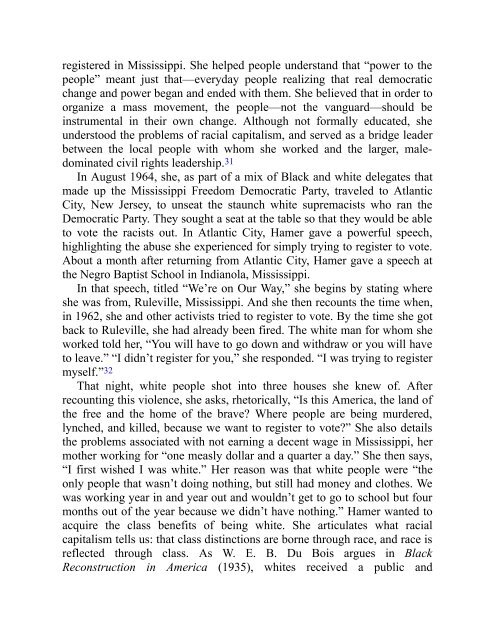Create successful ePaper yourself
Turn your PDF publications into a flip-book with our unique Google optimized e-Paper software.
egistered in Mississippi. She helped people understand that “power to <strong>the</strong><br />
people” meant just that—everyday people realizing that real democratic<br />
change and power began and ended with <strong>the</strong>m. She believed that in order to<br />
organize a mass movement, <strong>the</strong> people—not <strong>the</strong> vanguard—should be<br />
instrumental in <strong>the</strong>ir own change. Although not formally educated, she<br />
understood <strong>the</strong> problems <strong>of</strong> racial capitalism, and served as a bridge leader<br />
between <strong>the</strong> local people with whom she worked and <strong>the</strong> larger, maledominated<br />
civil rights leadership. 31<br />
In August 1964, she, as part <strong>of</strong> a mix <strong>of</strong> Black and white delegates that<br />
made up <strong>the</strong> Mississippi Freedom Democratic Party, traveled to Atlantic<br />
City, New Jersey, to unseat <strong>the</strong> staunch white supremacists who ran <strong>the</strong><br />
Democratic Party. They sought a seat at <strong>the</strong> table so that <strong>the</strong>y would be able<br />
to vote <strong>the</strong> racists out. In Atlantic City, Hamer gave a powerful speech,<br />
highlighting <strong>the</strong> abuse she experienced for simply trying to register to vote.<br />
About a month after returning from Atlantic City, Hamer gave a speech at<br />
<strong>the</strong> Negro Baptist School in Indianola, Mississippi.<br />
In that speech, titled “We’re on Our Way,” she begins by stating where<br />
she was from, Ruleville, Mississippi. <strong>An</strong>d she <strong>the</strong>n recounts <strong>the</strong> time when,<br />
in 1962, she and o<strong>the</strong>r activists tried to register to vote. By <strong>the</strong> time she got<br />
back to Ruleville, she had already been fired. The white man for whom she<br />
worked told her, “You will have to go down and withdraw or you will have<br />
to leave.” “I didn’t register for you,” she responded. “I was trying to register<br />
myself.” 32<br />
That night, white people shot into three houses she knew <strong>of</strong>. After<br />
recounting this violence, she asks, rhetorically, “Is this America, <strong>the</strong> land <strong>of</strong><br />
<strong>the</strong> free and <strong>the</strong> home <strong>of</strong> <strong>the</strong> brave? Where people are being murdered,<br />
lynched, and killed, because we want to register to vote?” She also details<br />
<strong>the</strong> problems associated with not earning a decent wage in Mississippi, her<br />
mo<strong>the</strong>r working for “one measly dollar and a quarter a day.” She <strong>the</strong>n says,<br />
“I first wished I was white.” Her reason was that white people were “<strong>the</strong><br />
only people that wasn’t doing nothing, but still had money and clo<strong>the</strong>s. We<br />
was working year in and year out and wouldn’t get to go to school but four<br />
months out <strong>of</strong> <strong>the</strong> year because we didn’t have nothing.” Hamer wanted to<br />
acquire <strong>the</strong> class benefits <strong>of</strong> being white. She articulates what racial<br />
capitalism tells us: that class distinctions are borne through race, and race is<br />
reflected through class. As W. E. B. Du Bois argues in Black<br />
Reconstruction in America (1935), whites received a public and


















